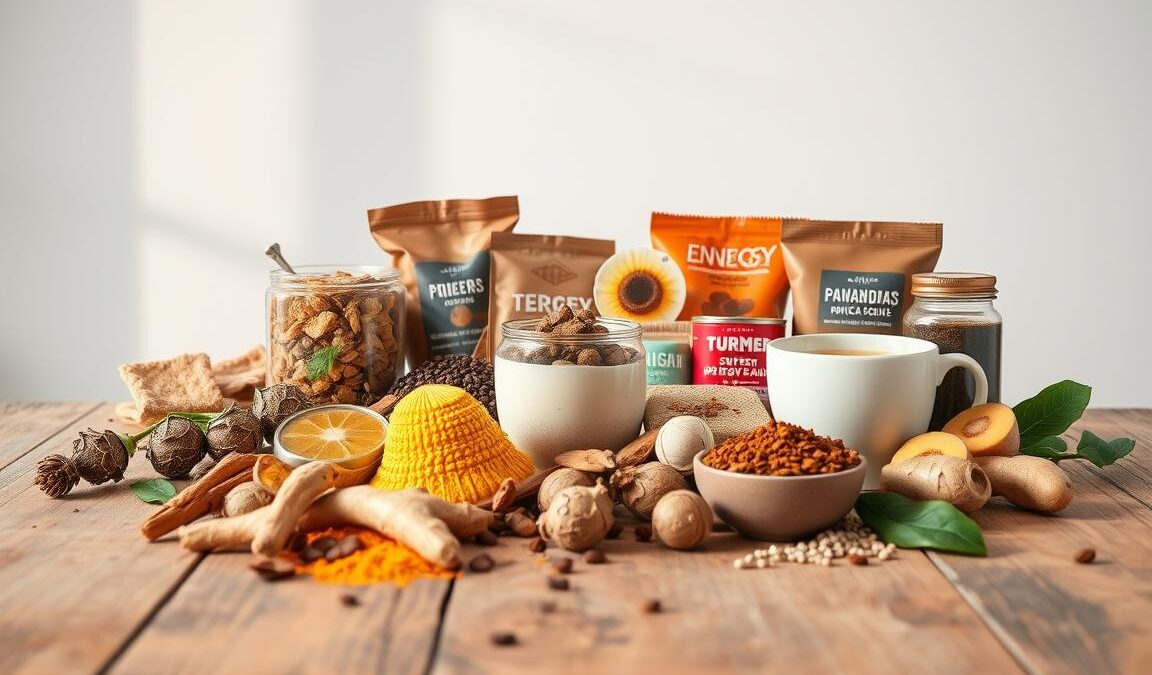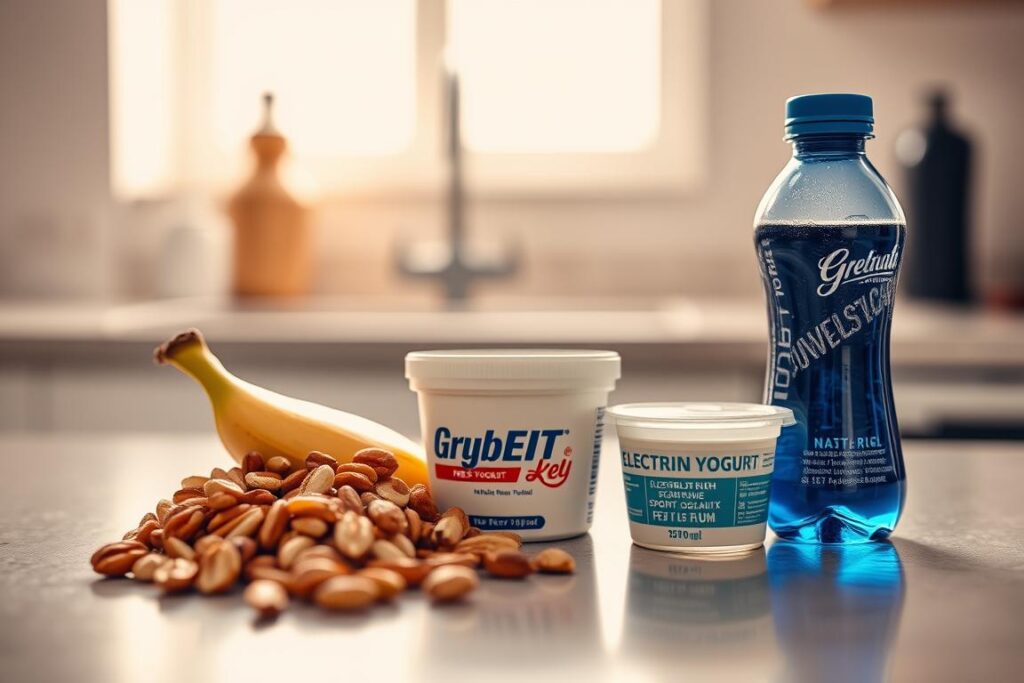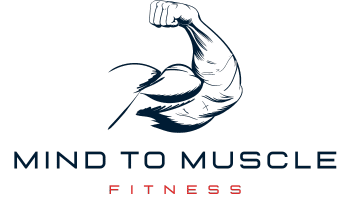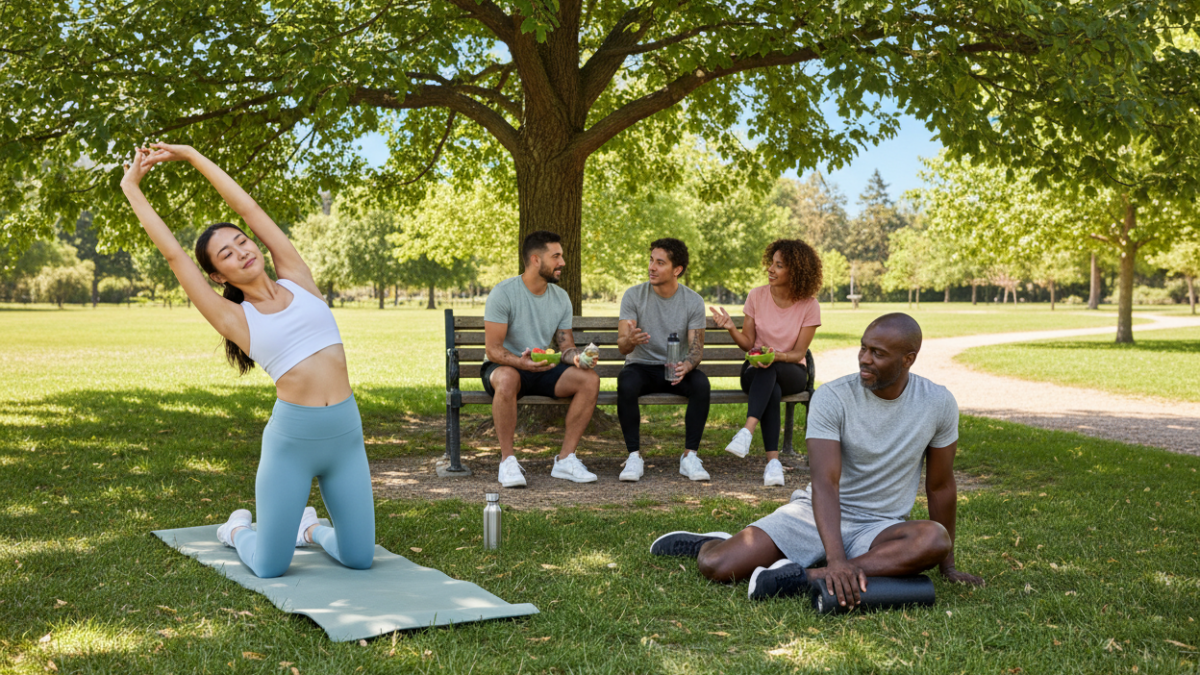
Adaptogenic Pre‑Workout Snacks for Steady Energy
adaptogenic pre-workout snacks can help you feel steady and focused instead of jittery before exercise.
You want usable fuel that your body taps fast. Quick carbs boost glucose and muscle glycogen for endurance and strength.
Add a little protein when you have time, and keep fats and fiber minimal close to a session to avoid stomach slowdown.
Think of this as a simple routine you can test. You’ll learn which snack formats fit short cardio, heavy lifts, or long workouts.
Practical tips: choose cleanly digesting food, tweak timing to how you feel, and track results to sharpen performance.
Key Takeaways
- Use quick carbs close to training for steady energy and less mid-session fatigue.
- Add protein if you eat more than an hour before to support muscle repair.
- Limit high fat and fiber within two hours of a hard session to avoid GI issues.
- Test portion size and timing; your body will tell you what works best.
- Include mild plant compounds like beetroot or matcha for support without heavy stimulants.
Why adaptogenic pre-workout snacks beat a last-minute sugar rush
Does a quick candy boost actually help your session — or hurt it?
Short sugar spikes raise blood glucose fast, then drop you into a crash. That hurts steady energy and lowers workout performance.
What works better? Small amounts of quick-digesting carbs that top off glycogen stores without the rebound.
If you have little time, pick low-fiber, low-fats options so your stomach stays light and your muscles get fuel fast.
- Short window: simple carbohydrates for immediate usable energy.
- 60+ minutes: add a bit of protein to steady output and support muscles.
- Avoid: candy-like hits; they often give a temporary boost, then a crash.
How to choose a pre-workout snack for your body and your workout
Choosing the right bite before exercise can sharpen your focus and power.
Q: How hard will you train? A: For sprints or heavy lifts, pick a small, fast-digesting option so blood stays in muscles, not digestion. For longer, steady sessions, favor carbs you can absorb over time.
Q: How much time do you have? A: Under an hour, go simple with quick carbohydrates. Sixty to ninety minutes lets you add a little protein. Two to three hours before, a fuller meal with whole grain and produce is fine.
- Test tolerance: if fiber or fat bothers your stomach, choose lighter items closer to start time.
- Temperature and form: Greek yogurt with berries is spoonable at an hour out; thin apple slices on whole grain toast may be too heavy minutes before.
- Track response 15–30 minutes in and tweak portion or protein amount next time.
| Time before workout | Best choice | Why it works |
|---|---|---|
| < 60 minutes | Banana or small fruit cup | Quick carbohydrates for fast energy and minimal gastric load |
| 60–90 minutes | Greek yogurt with berries | Carbs + small protein dose to steady fuel |
| 2–3 hours | Whole grain toast with peanut and slices of banana | Balanced carbs, some healthy fat, and sustained nutrients |
Want a ready option? Try a quick pre-workout smoothie when you have limited prep time. Build a short list of go-to choices so deciding before a session becomes automatic.
Best adaptogenic pre-workout snacks for steady energy and performance
Pick snacks that give steady power, not a short-lived sugar spike. Which combos work best for you depends on time and intensity.
Here are compact, practical pairings and why they help. Use the timing tips to avoid stomach trouble and keep your focus.
- Banana slices on whole grain bread with peanut butter and honey: quick energy from bananas and honey, plus steady carbs from whole grain bread. Best 60–90 minutes out.
- Greek yogurt parfait with berries, granola, and a pinch of cocoa: protein from greek yogurt supports muscles; keep granola modest if you’re under an hour.
- Overnight oats with chia, milk, cinnamon, and raisins: makes whole grain carbs and fiber for 2–3 hour windows without weighing you down.
- Beet smoothie (beet juice, banana, greek yogurt, honey): nitrates aid blood flow; blend and drink 60–90 minutes before longer efforts.
- Apple slices with peanut butter on multigrain toast: familiar balance of quick carbs and a light smear of peanut butter if you’re close to training.
- Protein shake with milk, banana, and a spoon of peanut butter: fast to assemble and easy to digest about an hour out.
- Baked plantain chips with hummus: light complex carbs with a savory twist—watch hummus portions when time is short.
- Trail mix (small handful of dried fruit and nuts): portable quick energy; keep portions small to limit fat before a session.
- Matcha latte with milk and a half bagel: gentle caffeine plus carbs for alertness without a crash.
- Coconut water plus a small cup of oatmeal: electrolytes from coconut water and gentle carbs from oats; best when you have an hour.
| Snack | Main benefit | Best timing | Digestion note |
|---|---|---|---|
| Banana + whole grain bread + peanut butter | Fast glucose + steady carbs | 60–90 minutes | Light smear of butter or peanut butter to avoid heaviness |
| Greek yogurt parfait | Protein + antioxidants | 60–90 minutes (or earlier) | Limit granola if |
| Overnight oats with milk | Sustained complex carbs | 2–3 hours | Good for fuller meals; not ideal right before start |
| Beet smoothie | Nitrate boost for endurance | 60–90 minutes | Blend smooth; avoid excess fiber |
Timing your pre-workout snack for maximum energy
Small timing tweaks can turn a sluggish start into strong first sets. When you plan your food around the clock, your body uses carbs to fuel muscle work, not digestion. Below are clear, science-based rules to cut guesswork.

Less than 60 minutes before training
Choose simple carbs and low fiber. Think banana, applesauce, a half bagel, or a small sports drink. These give quick energy and reduce cramp risk.
About 60–90 minutes out
Add a little protein to steady output. Try greek yogurt with berries or chocolate milk and a banana. Protein slows the release of carbs without heavy digestion.
Two to three hours pre-gym
Build a balanced plate with whole grain, lean protein, and small healthy fats. Oatmeal with milk and a drizzle of honey fits this window well.
How many carbs to eat based on time
| Time before workout | Carb target | Example |
|---|---|---|
| ~1 hour | ≈1 g/kg body weight | Banana or half bagel |
| ~2 hours | ≈2 g/kg body weight | Oatmeal with milk |
| ~3 hours | ≈3 g/kg body weight | Whole grain toast, peanut butter |
Keep fluids up, lower fiber and fat when minutes are tight, and adjust by session type—sprints need simpler carbs; long efforts can use larger portions earlier.
Carbs, protein, and healthy fats: getting the mix right
What you eat before a session decides whether you feel strong or sluggish from the first set. Use timing to guide the mix so your body gets fuel, not a burden.
Carbohydrates for quick energy and topping up glycogen stores
Carbs are your primary workout fuel. Simple carbs work best close to start time. Complex carbs from whole grain choices suit you when you have two or more hours.
Protein to support muscle repair without weighing you down
Include some protein if you eat about an hour before training. A small portion helps muscle repair and recovery without heavy digestion. Keep servings modest when time is tight.
Healthy fats: when a little helps and when to hold off
Healthy fats add flavor and steadiness, but fats slow gastric emptying. Save most fats for meals 2–3 hours before a workout. If you tolerate a little fat earlier, use only a small amount.
- Close to start: favor quick carbs for instant energy.
- 60+ minutes: add light protein to steady fuel.
- 2–3 hours: include complex carbs and small amounts of healthy fats.
| Window | Main focus | Example |
|---|---|---|
| <60 minutes | Simple carbs | Banana or half bagel |
| 60–90 minutes | Carbs + light protein | Greek yogurt + fruit |
| 2–3 hours | Complex carbs + small fats | Oatmeal with nut butter |
Adaptogens that support focus, endurance, and recovery
You can layer small botanical aids on top of solid nutrition to support focus and endurance.
Cordyceps — anti-fatigue and oxygen support
What it does: May help reduce perceived fatigue and improve oxygen use during hard efforts.
Timing: Daily use is common; try it before a longer workout to see subtle benefits.
Ashwagandha — stress reduction and steady energy
What it does: Can lower stress and steady energy when taken consistently.
Who benefits: Use if anxiety or poor sleep drains your workouts and recovery.
Beetroot — nitrates for blood flow
Tip: Drink 3–6 oz beet juice or 1 tsp beet powder about 60–90 minutes pre-workout.
Why: Nitrates support blood flow and can help endurance and oxygen efficiency.
Matcha — caffeine with L-theanine for smooth focus
Why use it: Provides alertness with fewer jitters than coffee.
When: Drink 30–60 minutes before a workout for best focus.
Pomegranate & cocoa — nitric oxide and antioxidants
Role: Polyphenols support nitric oxide and antioxidant defenses to aid performance and recovery.
- Start with one herb or extract at a time to track effects.
- Keep carbs and a little protein as your base, then layer these options.
- If you’re sensitive to caffeine, pick beetroot or pomegranate on key days.
| Ingredient | Primary benefit | Suggested timing |
|---|---|---|
| Cordyceps | Anti-fatigue | Daily / pre-long workouts |
| Ashwagandha | Stress support | Daily for steady effect |
| Beetroot | Blood flow, endurance | 60–90 minutes pre-workout |
| Matcha | Focus, gentle stimulant | 30–60 minutes pre-workout |
Quick-assemble options when you’re heading to the gym
Running late? A tiny, targeted bite can keep your first sets sharp.
Here are ultra-fast builds you can grab in seconds. Use timing tips so you feel fuel, not full.
Chocolate milk with a banana for rapid carbs and protein
Why it works: Chocolate milk gives carbs and protein that digest quickly. Bananas add fast carbs and potassium for muscles.
- Best when you have 15–60 minutes before a workout.
- Keep portions small if you only have 15–20 minutes to avoid stomach bounce.
- Swap to lactose-free milk if dairy bothers you.
Greek yogurt with granola and berries, ready in seconds
Why it works: Greek yogurt supplies protein while berries add quick carbs and antioxidants. Use a light sprinkle of granola.
- Ideal about 45–60 minutes out.
- Reduce granola if you’re leaving in under an hour.
- Choose high-protein yogurt versions if you want extra satiety.
| Option | Best timing | Quick tip |
|---|---|---|
| Chocolate milk + banana | 15–60 minutes | Small serving, sip water too |
| Greek yogurt + granola + berries | 45–60 minutes | Limit granola to a tablespoon if rushed |
| Hot cocoa + banana | 15–60 minutes | Warm swap for milk on cool days |
Quick reminders: keep portable options in your bag, add a pinch of salt on hot days, and pair each choice with a few sips of water so you arrive primed.
Hydration that actually helps your muscles work
The fluids you sip before the gym can make the difference between sharp sets and early fatigue.
What to drink: Coconut water with a pinch of salt supplies potassium and boosts sodium slightly. That combo supports fluid balance so your muscles fire efficiently.

Coconut water and a pinch of salt for potassium and sodium
Drink steady sips in the hour before a session. Small amounts beat chugging at the door.
- Start hydrated: sip fluids during the hour leading into your workout to protect energy and focus.
- Electrolyte boost: coconut water plus a pinch of salt helps potassium and sodium balance for better muscle function.
- If you sweat a lot or train in heat, add a bit more salt to match losses and lower cramp risk.
- Keep the drink light—small, steady sips reduce sloshing and aid digestion.
- Plain water is fine for short efforts; use electrolytes for longer or hotter sessions to speed recovery.
| When | What | Why |
|---|---|---|
| 60 minutes before | Coconut water + pinch of salt | Replaces potassium and adds sodium for balance |
| During long sessions | Small sips regularly | Maintains fluid and keeps muscles firing |
| After training | Rehydrate + light carbs | Supports recovery and readies your body for next gym visit |
Quick checks: dilute coconut water half-and-half with water if it tastes sweet. Aim for pale straw urine before you leave. Pair hydration with a light pre-workout bite when you need both fluid and fuel.
Build your DIY natural pre-workout drink
Make a clean, natural drink that primes your muscles and mind in under five minutes. This recipe is repeatable, portable, and easy to tweak.
Ingredients and exact recipe
- 1 cup black coffee or matcha (natural caffeine + L-theanine)
- 3 oz beet juice or 1 tsp beet powder (nitrate support)
- 1/2 tsp turmeric + 1/2 tsp cocoa + pinch black pepper
- 1 tbsp honey (or 2 dates) + pinch Himalayan salt
How to mix and timing
In a shaker, combine the cup of coffee or matcha with the beet juice or powder. Stir in turmeric, cocoa, and black pepper.
Add honey and a pinch of salt for quick carbs and electrolytes. Shake with ice if you prefer cold.
Drink it 30–45 minutes before training so the caffeine, nitrates, and carbs align with warm-up and first sets.
| Component | Role | Practical swap |
|---|---|---|
| Coffee / Matcha | Focus + mild stimulant | Skip if caffeine-sensitive |
| Beet juice | Blood-flow boost | Use beet powder |
| Honey / dates | Quick carbs + energy boost | Two dates instead of honey |
Snack ideas by workout goal: strength, endurance, or mixed training
Match your fuel to the session: different goals need different bites. Which build supports your performance best?
Strength days
Whole grain bread with a thin layer of peanut butter, sliced bananas, and a glass of milk gives fast carbs plus a touch of protein.
Eat this about 60–90 minutes before heavy lifting so you feel energized, not heavy.
If you want more protein, add a small side of Greek-style dairy or raise the milk volume to tolerance.
Endurance days
Sip beet juice 60–90 minutes before long efforts, and have oatmeal with berries earlier to provide steady carbohydrates throughout a long workout.
Keep fats low near start time so stomach comfort lasts during long runs or rides.
Mixed training
Pair a smaller carb source with modest protein. Try yogurt and fruit about an hour before a session.
If the session runs long, bring a banana or chewable carbs to top up energy on the go.
- Prep night-before options for early mornings: bread, nut butter, and oats save time.
- Adjust portions by body size and duration; start smaller and scale up.
- Test on non-PR days, then use the build that makes you feel strongest.
| Goal | Suggested build | Timing | Digestion note |
|---|---|---|---|
| Strength | Whole grain bread + peanut butter + bananas + milk | 60–90 minutes | Low fat smear; small protein for performance |
| Endurance | Beet juice + oatmeal with berries | Oatmeal 90–120 min; beet 60–90 min | Sustained carbs; keep fats minimal |
| Mixed | Greek yogurt + fruit or small sandwich | ~60 minutes | Balanced carbs and protein; portable |
Safety, personalization, and when to go lighter
How do you decide when to simplify your routine before a gym session?
Some people react to concentrated formulas. A 2019 study found about 54% of users reported side effects like nausea, skin changes, or heart symptoms tied to high-dose stimulants and additives. If you get jitters or digestive upset, step back to whole foods you tolerate.
- If you have under an hour, keep portions small and fats low so your muscles get fuel without slow digestion.
- With heart or blood-pressure issues, avoid strong stimulants and consult a clinician before adding supplements.
- On easy or recovery days, scale down the portion and prioritize hydration over big bites.
- Watch for red flags—nausea, palpitations, or flushing—and pause the product if they appear.
| Concern | When to choose lighter | Practical swap |
|---|---|---|
| Stomach upset | <1 hour before gym | Half a banana instead of a heavy bar |
| Stimulant sensitivity | Any time | Beet or pomegranate drink instead of caffeinated mix |
| Training late | Within a few hours workout | Low-caffeine options to protect sleep |
Build your plan on everyday nutrition. Start with one change at a time—timing, portion, or ingredient—and track how your body responds. If you have medical concerns, get personalized advice from a clinician before trying new products.
Conclusion
Wrap up your routine with a simple rule: match what you eat to how much time you have before your workout.
Use quick carbohydrates for lift-off and add modest protein when you have an hour or more. Keep fat and fiber low close to start so digestion doesn’t steal energy from your muscles.
Lean on reliable foods—oatmeal, fruit, yogurt, and a smear of peanut butter—for steady fuel and an energy boost without a crash. Consider beet or matcha for focus and blood flow, and sip fluids with a pinch of salt when needed.
Log what you ate, the hours before training, and how your performance felt in the first 15 minutes. Pick one go-to snack for tomorrow’s session and refine from there. Small, repeatable choices build better recovery and consistent performance.



